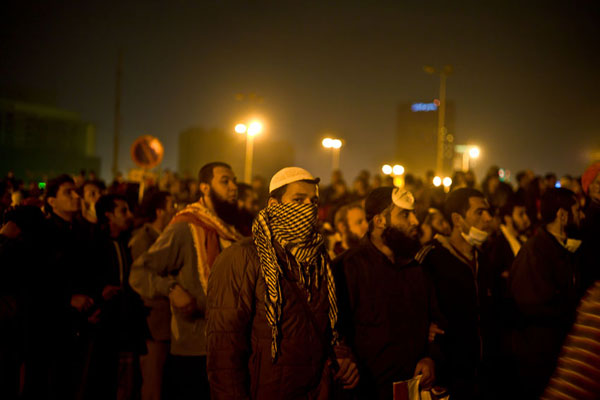10 killed in Egypt as election nears
 0 Comment(s)
0 Comment(s) Print
Print E-mail
China.org.cn, November 21, 2011
E-mail
China.org.cn, November 21, 2011
The Egyptian parliamentary elections will be held on time as 10 people died and 214 others were injured in continued clashes between protesters and police in central Cairo on Sunday, officials said.
|
Egyptian officials said that the parliamentary elections will be held on time as 10 people died and 214 others were injured in continued clashes between protesters and police in central Cairo on Nov. 20. [Xinhua] |
The fresh casualties raised the death toll to 12 during the past two days of violence. Over 1,000 other people were injured following the death of two young protesters in Cairo and Alexandria on Saturday.
In Cairo's Tahrir Square, the epicenter of the mass protests from Jan. 25 to Feb. 11 that toppled Hosni Mubarak's regime, tens of thousands of people gathered on Sunday morning, calling for the military rulers to transfer power to a civilian government as soon as possible. Some people attempted to storm the Interior Ministry building nearby but were stopped by the police.
Some protesters said under current circumstances, security for the elections would be a great concern.
In Alexandria, police fired tear gas to disperse large crowds of protesters and clashes followed. Since Friday, protests have continued in Cairo, Alexandria and some other cities.
As of Sunday night, there were still thousands of protesters gathering in Tahrir Square.
The violence initially broke out when riot police attempted to clear Tahrir Square protesters on Saturday morning. It raised concerns about the security for the historic parliamentary vote slated for Nov. 28, but the Interior Ministry said it is capable of providing security measures for the elections.
The Egyptian government said in a statement after an urgent meeting Sunday the parliamentary elections would start as scheduled despite the latest protests, accusing some people of intending to disturb the elections and preventing the formation of state institutions.
The government and the ruling Supreme Council of the Armed Forces will shoulder responsibilities during this sensitive historical period, the statement added.
The Egyptian people have the rights of peaceful demonstrations to voice their demands, but the government will firmly reject any attempt to use the protests to harm the country's security and stability, the government said.
The government will continue to hold dialogue with different political groups to reach consensus on the constitutional charter and a civilian state, said the statement.
The ruling military council expressed regret for the clashes and assigned the government to take measures to avoid similar incidents.
The military council said it will stick to the power transfer schedule and has no intention to delay it. Any move to disrupt the democratic transition process will not be allowed, it stressed.
The latest protests were sparked by controversy over the constitutional principles, as the opposition parties did not agree with the interim government to grant more power to the military.
Deputy Prime Minister Ali al-Selmi said Saturday that dialogue would be held in the coming few days with other political powers to reach an agreement on the amended document before submitting it to the ruling military council for ratification.
Protests are common after the fall of Mubarak. Egyptians often resort to the demonstrations to raise their demands, where violence occurs.
On Oct. 9, at least 25 people were killed in Cairo when police clashed with protesters, mostly Coptic Christians, in front of the Egyptian TV building.
The parliamentary elections will last until March 2012, following which a new constitution will be drafted and a new president elected.
The calls for an early transfer of power are likely to go on and protests will persist before the military rulers' announcement of a detailed timetable for the presidential elections and power transfer, analysts said.






